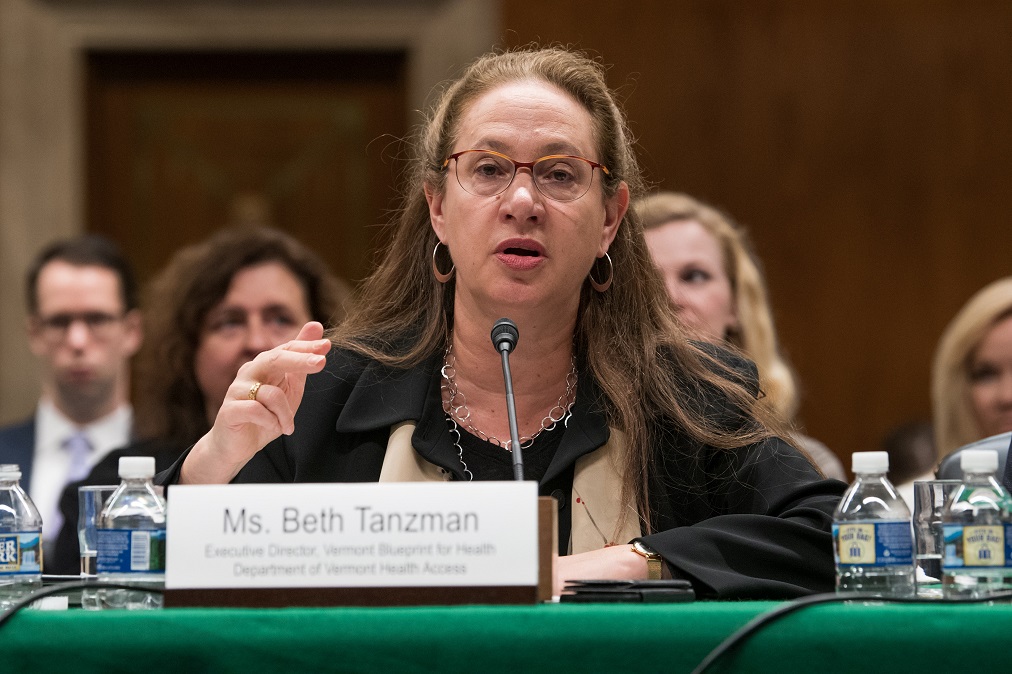On February 28, 2019 Blueprint for Health Executive Director Beth Tanzman testified to the U.S. Senate Appropriations Subcommittee on Labor, Health and Human Services, and Education regarding the opioid epidemic. Text of the testimony follows.

Testimony to the U.S. Senate Appropriations Subcommittee
on Labor, Health and Human Services, and Education
Regarding the Opioid Epidemic
February 28, 2019
Beth Tanzman, MSW
Executive Director, Vermont Blueprint for Health
Department of Vermont Health Access
Chairman Blunt, Ranking Member Murray, and Senator Leahy and staff thank-you for the opportunity to outline what we are learning in Vermont about addressing the opioid epidemic.
Vermont is here before you because we have successfully scaled treatment availability for Opioid Use Disorder state-wide. Through our Hub and Spoke program we are currently treating over 8,000 Vermonters (1.6% of the adult population) with Medication Assisted Treatment (MAT). Vermont treats a higher percentage of people with Opioid Use Disorder than any other state in the nation.
We provide Medication Assisted Treatment in primary care offices (Spokes) and in specialty addictions treatment programs (Hubs). Through a Health Home Medicaid plan we’ve built a programmatic framework that links primary care (Spokes) and addictions treatment programs (Hubs). Patients can move between Hubs and Spokes based on their needs. Clinical expertise is shared across primary care and substance abuse treatment providers.
There are strong signals that the Hub and Spoke program is facilitating positive outcomes. Vermont has the lowest opioid over dose death rate in New England. Vermonters receiving Medication Assisted Treatment have lower rates of: incarceration, hospitalizations, and emergency department use than do Vermonters with Opioid Use Disorder who receive care as usual. Our system of deploying teams of nurses and counselors to primary care Spokes - 2 FTE for every 100 Medicaid Members - combined with a strong back-up from Hub programs has dramatically increased the number of primary care providers offering Medication Assisted Treatment in Vermont.
What we’re learning may be helpful to others and a few conclusions stand out.
Medication Assisted Treatment, the combination of medications and counseling, is the most effective treatment for opioid use disorder and as such, it should be consistently available as the standard of care for this condition.
Insurance should pay for Medication Assisted Treatment. In Vermont we developed a Medicaid Health Home State Plan Amendment under the authority of section 2703 of the Affordable Care Act to create the Hub and Spoke Program. There are other approaches to using Medicaid that states can employ including: 1115 B Substance Use Waivers, State Plan Amendments, including MAT in managed care organization contracts, and increasing reimbursement rates for targeted services. Commercial payers should also participate: in Vermont two of our major commercial plans are piloting payments for Hub and Spoke Services.
The health system - especially primary care - has a key role in treating opioid addiction. The addictions treatment system cannot do this alone; there is simply not enough treatment capacity to meet the need brought on by this epidemic. The participation of primary care can effect greater integration of care, especially by coordinating pharmacological treatments with counseling, rehabilitation, and recovery supports.
The barriers to primary care participation in MAT (not enough provider time, patient complexity, difficulty integrating counseling supports) can be addressed by adding nursing and counseling resources to the primary care prescribing teams, as we did in Vermont.
Treatment is one element of a comprehensive response to the opioid epidemic. Other elements include prevention -reducing peoples’ exposure to opioids in the first place, harm reduction such as wide availability of the overdose reversal medication Narcan to help prevent overdose deaths, and recovery supports – including vocational services to help people in recovery participate fully in our communities.
Leadership focus matters. I have had the honor of serving under two consecutive Governors, democratic and republican, who have both provided leadership and resources to address the opioid epidemic in Vermont.
In closing, we have made much progress in Vermont, much of it with the support our federal partners. Yet while we have some of the best access to treatment in the nation, we have not solved this problem. Every week two Vermonters die from a drug overdose. Tragically we’ve also experienced high numbers of children under the age of five, who come into state custody due to this crisis. We must learn how to do better by our families and communities.
Thank-you.
